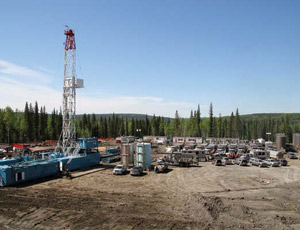China, which has surpassed Japan as the world’s second-largest economy, signaled its intent to invest in North America as Calgary-based natural-gas producer Encana Corp. on Feb. 13 announced the largest Chinese investment in Canada to date. Under terms of a $5.4-billion cooperation agreement, PetroChina, an arm of China’s state-owned National Petroleum Co., will acquire a 50% share in Encana’s Cutbank Ridge gas production facilities, representing 255 million cubic feet per day of proved reserves of approximately one trillion cu ft on 250,000 hectares straddling the Alberta-British Columbia border.

Calling the deal a milestone in relations between his company and PetroChina, Encana CEO Randy Eresman said the joint venture is “the culmination of more than nine months of discussions between PetroChina and Encana” and will increase the value of the Cutbank Ridge operations by “accelerating our pace of development and by leveraging increased capital and operating efficiencies.”
Alan Boras, media relations vice president for Encana, described Cutbank Ridge as “among our most competitive properties.” Boras added, “How we engineer and develop those properties to maximize efficiency and lower cost” depends upon the gas reserve’s “fundamental geological characteristics.” He said benefits from expanded development will flow to taxpayers and engineering consultants.
“Let’s say we build a gas plant. There’d be engineering firms and consultant firms that would work on that because that would be their expertise. So, over time, absolutely—we are always hiring the service of engineering consultant firms,” Boras said.
Cutbank Ridge currently is represented on the ground by approximately 700 million cu ft per day of processing capacity, 3,400 kilometers of pipelines and the Hythe natural-gas storage facility in northern Alberta. Boras said infrastructure will expand with the deal between Encana and PetroChina.
One last hurdle is the Investment Canada Act. Against the backdrop of Ottawa’s recent use of the measure to stop BHP Billiton’s $40-billion takeover of Potash Corp., Saskatchewan, federal industry minister Tony Clement reminded players in the Encana–PetroChina deal of who has the final say. No deal can proceed, he said, unless it meets the law’s “net economic-benefit test.” Alan Boras said Encana remains confident it can meet that test.
“We have a very strong case to make about the net benefit for Canada in economic activity. This is going to bring investment [and] jobs, and that will translate into prosperity for the operations and the supplies and services that feed those [operations].”

Post a comment to this article
Report Abusive Comment